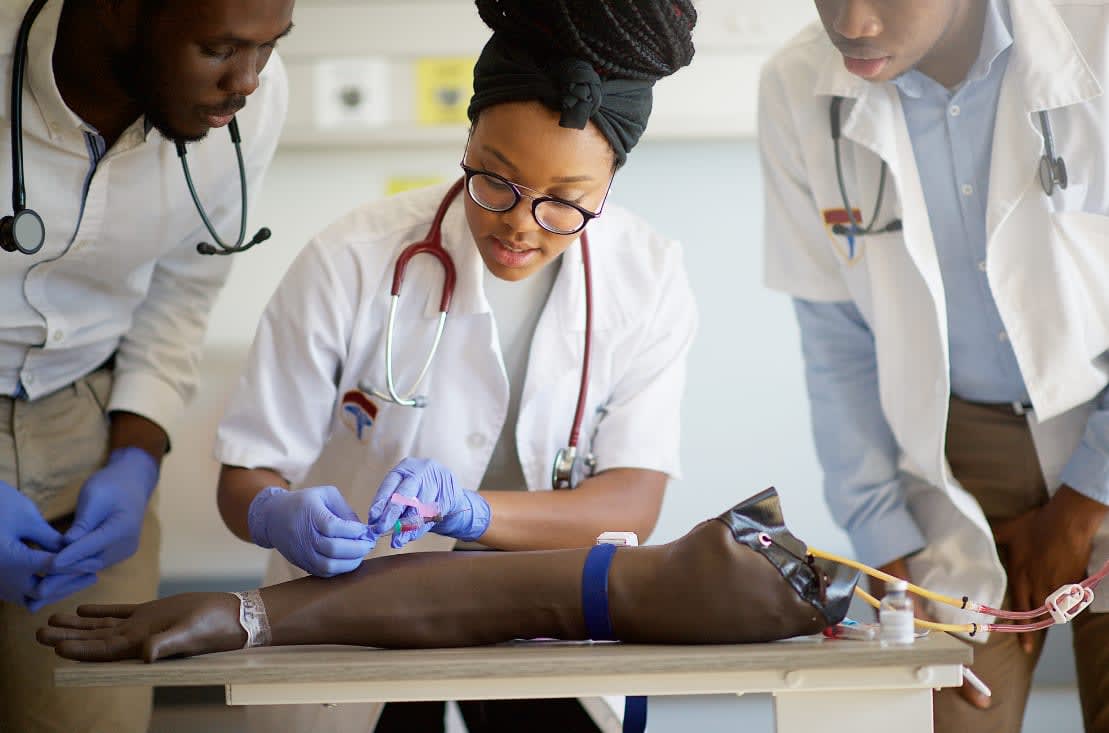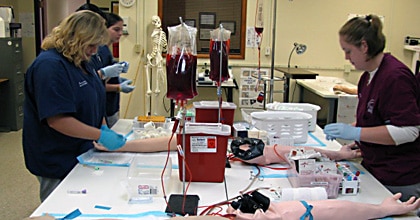The Path to Certification: Recognizing the Phlebotomy Educating Training Course Trip and Its Relevance
As you take into consideration the path to certification in phlebotomy, it's vital to understand the duty you'll play in health care. Your training will cover vital skills, from blood collection methods to patient communication.

The Function of Phlebotomists in Medical Care
Phlebotomists play a crucial role in the healthcare system, functioning as the crucial link in between individuals and necessary analysis testing. You'll do blood attracts, making sure examples are accumulated accurately and safely. Your knowledge aids in identifying medical problems, keeping track of health, and directing therapy decisions.
In your everyday communications, you'll need to establish trust fund with patients, making them really feel comfy during what may be a stressful experience. You're responsible for identifying and taking care of examples carefully to stop contamination or mistakes, which could influence test outcomes.
Past this, you'll typically work together with physicians and registered nurses, connecting critical info about patients' problems. By understanding your skills, you add meaningfully to individual treatment, making you an important component of the medical group.
Overview of Phlebotomy Training Programs
When exploring phlebotomy training programs, you'll locate various kinds designed to fit various routines and learning styles. Each program assists you create necessary skills like blood collection and person interaction. Recognizing these options is vital to selecting the right path for your job.
Sorts Of Training Programs
A number of types of training programs are readily available for those aiming to come to be proficient in phlebotomy. You can select from certificate programs, which typically last a few months and concentrate on vital abilities. There are likewise diploma programs that provide an even more detailed education, frequently lasting approximately a year. If you're trying to find a much deeper understanding, an associate degree in a related field could be the best fit. On-line training courses supply versatility for those balancing job or family members commitments, permitting you to research at your own speed. In addition, some health centers and centers use on-the-job training programs, giving sensible experience while you find out. Whatever path you choose, each program intends to furnish you with the needed skills for an effective phlebotomy job.

Key Skills Established
Understanding phlebotomy requires a collection of crucial skills that are established via complete training programs. Furthermore, communication abilities are fundamental; you'll need to communicate with clients, clarify treatments, and placed them at convenience. Each of these skills is vital for your success as a licensed phlebotomist, making you a useful possession in any kind of health care setup.
Trick Components of a Phlebotomy Training Course
In a phlebotomy course, you'll concentrate on crucial subjects that prepared for your future profession. You'll participate in hands-on training that allows you to apply what you have actually learned in real-world setups. Both the curriculum and sensible experience are crucial for your success as a phlebotomist.
Curriculum Introduction
While seeking a phlebotomy training course, you'll run into a core educational program created to furnish you with basic skills and knowledge. Phlebotomy Classes Near Me. This curriculum normally consists of makeup and physiology, concentrating on the circulatory system and comprehending blood parts. You'll also find out about different kinds of blood collection techniques, consisting of venipuncture and capillary slit techniques
Furthermore, infection control and safety methods are vital elements, guaranteeing you recognize exactly how to maintain a sterile setting. You'll research patient communication, stressing interaction and compassion, which are critical for alleviating individual stress and anxiety.
Hands-On Training Experience
Getting hands-on experience is an important part of your phlebotomy training course. This practical training allows you to apply what you have actually learned in a real-world setting, enhancing your abilities and self-confidence. Phlebotomy Courses Near Me.
Additionally, you'll obtain the chance to communicate with patients, which is vital for developing your communication abilities. This combination of technical effectiveness and social abilities is crucial for your success as a qualified phlebotomist. Inevitably, hands-on training is where theory meets method, solidifying your knowledge and preparedness for certification.
Accreditation and Licensing Demands
Before you can begin your career in phlebotomy, it is important to comprehend the certification and licensing requirements that vary by state. Many states need phlebotomists to hold a certification from an identified company, such as the National Phlebotomy Association or the American Culture for Medical Pathology. These certifications normally entail passing an examination that tests your knowledge and skills in the area.
In addition to accreditation, some states have certain licensing requirements. You may require to complete a certain number of hours in clinical practice, submit evidence of training, or go through a history check. It is necessary to investigate your state's guidelines to make certain you satisfy all required requirements.
Staying informed about these requirements not just aids you safeguard a placement yet additionally improves your reliability as a professional. By fulfilling these requirements, you'll be well on your way to an effective job in phlebotomy.
Hands-On Training and Practical Experience
Hands-on training and sensible experience are essential components of your phlebotomy education, as they allow you to use theoretical knowledge in real-world circumstances. Throughout your training, you'll participate in supervised venipuncture, learn correct strategies, and end up being knowledgeable about various blood collection equipment. This direct involvement is important for building your self-confidence and refining your skills.
You'll function very closely with seasoned specialists who can lead you with the nuances of individual interaction and example handling. Each method session not only enhances your understanding however also prepares you for the you can try here busy environment of medical care settings.
In addition, lots of programs incorporate professional rotations, permitting you to experience diverse setups, from health centers to outpatient centers. This direct exposure assists you adapt to various obstacles and individual needs, guaranteeing you're well-prepared for your future role. Accept these possibilities, as they're vital to ending up being a skilled and thoughtful phlebotomist.
Challenges Dealt With Throughout Training
While acquiring hands-on experience is crucial, it's essential to identify the challenges that can develop during your phlebotomy training. You may run into stress and anxiety when performing procedures on genuine people, especially if you're new to the setting. The stress to get whatever right can be frustrating. In addition, mastering the abilities required for blood draws takes method; you might fight with technique initially.
Time monitoring can additionally be a difficulty, as harmonizing concept, sensible sessions, and individual dedications can really feel daunting. You might encounter differing finding out rates amongst your peers, bring about sensations of insecurity if you assume you're dropping behind. Ultimately, adapting to the different personalities of teachers can be tough, as each might have an one-of-a-kind training design.
Acknowledging these challenges beforehand can prepare you for success and assist you establish resilience throughout your training trip.
Job Opportunities After Qualification

As you get experience, you might also take into consideration focusing on locations like pediatric or geriatric phlebotomy, accommodating specific individual needs. Some phlebotomists select to progress their professions by becoming lab specialists or seeking further education and learning in medical care fields.
In addition, your accreditation can cause roles in training or monitoring brand-new phlebotomists, permitting you to share your knowledge. With the medical care industry continually growing, your abilities will certainly always be in need, leading the way for a steady and satisfying career. Accept the possibilities awaiting you!
Often Asked Inquiries
What Is the Common Duration of a Phlebotomy Educating Training Course?
Phlebotomy training courses commonly last around four to eight weeks. You'll participate in hands-on technique, classroom direction, and online understanding. Completing this training prepares you for accreditation and a satisfying job in click over here now health care.
Are Online Phlebotomy Courses Available?
Yes, on the internet phlebotomy training courses are readily available. They offer versatility and ease, allowing you to study at your own rate. Simply validate the program is certified to meet accreditation needs and obtain valuable skills for your career.
Just How Much Does Phlebotomy Training Generally Expense?
Phlebotomy training generally costs between $700 and $2,500, depending on the program and location. You ought to consider elements like course size, consisted of products, and hands-on experience when choosing the best training Home Page for you.
What Are Common Prerequisites for Phlebotomy Training?
Usual requirements for phlebotomy training frequently consist of a senior high school diploma or GED, immunizations, and a history check. Some programs might also call for basic medical care understanding or certifications, guaranteeing you're prepared for hands-on training.
Can I Function While Completing My Phlebotomy Training?
Yes, you can function while completing your phlebotomy training. Several trainees equilibrium tasks with their studies, however make sure to handle your time efficiently to assure you satisfy both job and training dedications effectively.